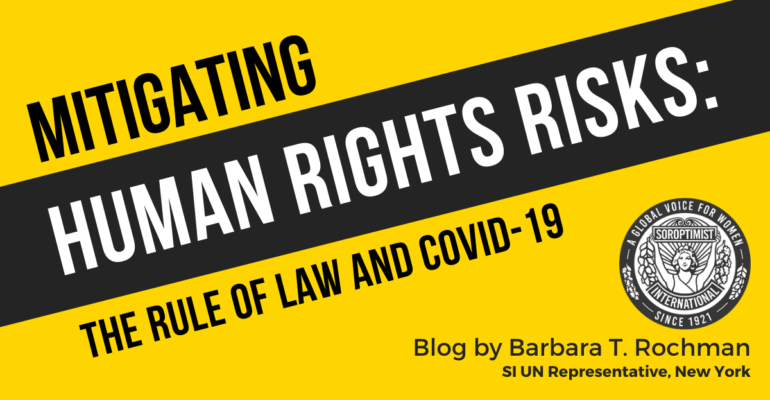Blog by Barbara T. Rochman, SI United Nations (UN) Representative, New York.
Barbara Rochman, member of the Committee on Migration, and the Committee to Stop Trafficking in Persons (CSTIP), takes a closer look at a recent report by UN Secretary General Antonio Guterres, ‘Strengthening and coordinating United Nations rule of law activities’, summarising Section II A, ‘Mitigating the risk and impact of COVID-19’.
“As emergency measures have been adopted worldwide in response to COVID-19, upholding the rule of law to protect people’s human rights and access to justice has become critical.”
With the COVID-19 pandemic, affecting the health of millions and impacting the global economy, a further issue is posing a threat to human rights. The expansion of roles within law enforcement, and other security forces, brings with it the risk of disproportionate use of force.
The COVID-19 crisis has exacerbated issues within struggling judiciary and internal oversight bodies, and so, gaps in deterring possible abuses of power are starting to appear.
To meet this changing environment, UN System entities have taken the following mitigating steps:
- Meeting States’ obligations under international law.
The UN has worked to provide resources to ensure that Member States adopt measures with respect to COVID-19, which comply with their obligations under international law, including international human rights law.
- Use of accessible and inexpensive technologies
To mitigate risks related to COVID-19 in UN peacekeeping operations and other fragile settings, the UN has supported use of accessible and inexpensive technologies providing remote alternatives for the effective functioning of judicial processes. In the future, these technologies will help to improve access to justice where insecurity and other obstacles affect delivery of justice services.
- Prisons and detention centres
The UN has developed guidance advising authorities on following health protocols in prisons and detention facilities to address the impact of the virus on children and women in those facilities. To prevent the spread of the virus, tools such as remote justice and the immediate release of low risk prisoners and children have been implemented.
- Creating isolation centres
In some places, the UN has changed its emphasis on community anti-violence to include the sensitisation of local populations to such violence and repurposing facilities to be used as isolation centres.
- Policing and following good practices
The UN has supported some Member States to ensure respect for human rights norms and standards in policing. In other places, the UN are helping the governments in contact tracing, building good practices and using lessons learned during the Ebola crisis.
- Sexual and gender-based violence
The impact of the virus on economies has exposed migrant and refugee women and girls to sexual exploitation. Risks of violence against women and children have increased generally, with many are required to remain home and can find themselves subject to violence from those they live with. The UN has facilitated safe access to remote case management, counselling and legal services to support survivors of sexual and gender-based violence.
We should all be aware that the risks to our human rights and the rule of law have become integral to the spread of the virus. These various programmes show the efforts made by the UN and Member States, utilising experiences gained from previous pandemics, to create methods to mitigate the current dangers of COVID-19 and the threat posed to human rights and the rule of law.
To read the full report, click HERE.

